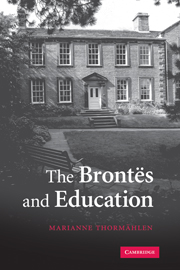12 - Pedagogical purposes and principles
Published online by Cambridge University Press: 22 September 2009
Summary
As previous chapters have pointed out, character development was regarded as the most important function of any educational undertaking in the nineteenth century. In the words of the great Continental educational philosopher Johann Friedrich Herbart (1776–1841), ‘The one and whole work of education may be summed up in the concept of morality’. However desirable academic ability and well-practised accomplishments might be, educationists at home and abroad were forever asserting that good manners and virtuous habits, exercised within the social framework to which the pupil belonged, were the true marks of a good education, whether it was provided by Eton, a governess or the village school.
The Brontë fiction as a body supports that view. The academic attainments of William Crimsworth, Louis Moore and M. Paul would not have invested them with hero status in Charlotte Brontë's novels without their personal virtues. The chief of those virtues are truthfulness, uprightness and good feeling, qualities signally lacking in other learned gentlemen, such as Messieurs Pelet and Rochemorte. Similarly, as a preceding chapter showed, all the accomplishments of Annabella Lowborough and Blanche Ingram are powerless to win them happiness: without personal worth they cannot even secure their worldly aims in the long term.
It should be borne in mind that the predominance of character formation was not a ‘conservative’ attitude in education: every theorist, whatever his or her nationality, religious faith and political allegiance, was fundamentally concerned with the making of good human beings.
- Type
- Chapter
- Information
- The Brontës and Education , pp. 155 - 169Publisher: Cambridge University PressPrint publication year: 2007

